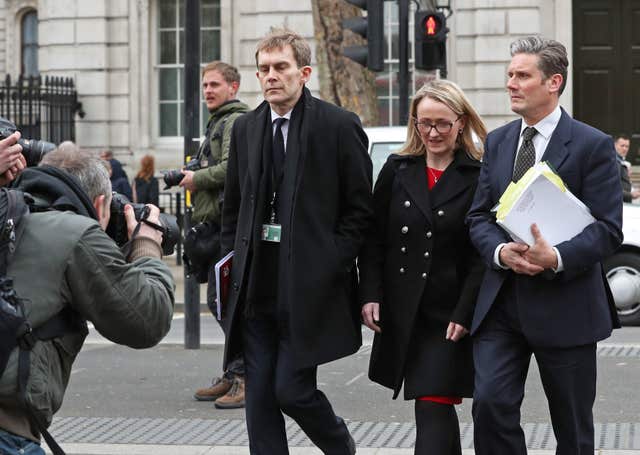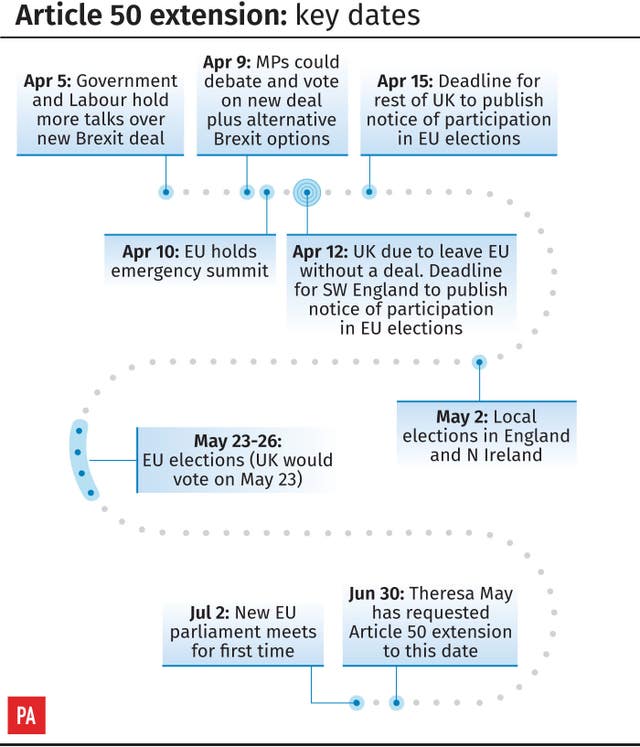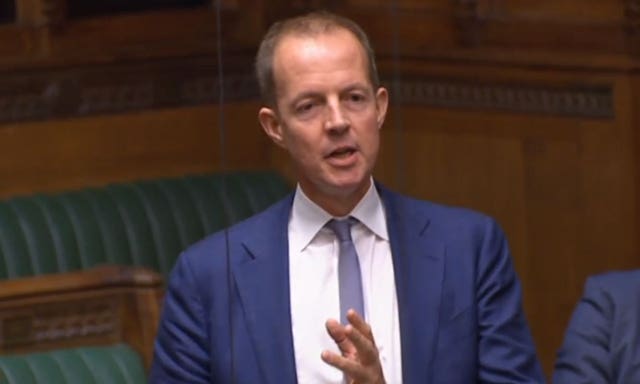Brexit: The past seven days
Theresa May finally reached out across the political divide.

It was the week when Theresa May finally reached out across the political divide in the search for a Brexit solution, and finally accepted that she must at least prepare for European elections, even if she does not want them to go ahead.
So what has happened and what will happen next?
– Days to go
Maybe seven, if Mrs May fails to secure an extension, or it is rejected by MPs. Or 47, if the PM lands the extension and gets a compromise deal through Parliament in time to cancel the European elections and leave on May 22. Or 86, if Mrs May wins the extension she wants but fails to get parliamentary approval for her deal and Britain quits without a withdrawal agreement on June 30. Or 371, if the EU27 accepts Donald Tusk’s proposal of a year-long extension from the April 10 summit, and the UK then fails to find a plan it can unite around. Or conceivably never, if a second referendum is called and voters decide to remain.
– What happened this week?
Monday saw MPs take part in a second round of indicative votes in a bid to find a solution which might command support in Parliament, but no proposal got a majority. Kenneth Clarke’s call for a customs union came closest, falling just three votes short. A marathon seven-hour Cabinet meeting on Tuesday ended with a dramatic address from Downing Street by Mrs May, in which the Prime Minister offered to work with Labour on a compromise deal.

Face-to-face talks between Mrs May and Jeremy Corbyn on Wednesday were followed by discussions between their negotiating teams, but two ministers quit the Government in protest. Meanwhile, MPs passed Yvette Cooper’s Bill, designed to block a no-deal Brexit, by a single vote. Friday saw Mrs May submit her formal request to Brussels for a further delay to Brexit to June 30, with the option of leaving earlier if her deal is ratified.
– What happens next?
Contacts between the Government and Labour are likely to continue through the weekend as they try to find a consensus deal that can be put to Parliament or, failing that, an agreed list of options to be put to MPs. If the Cooper Bill gets through the House of Lords unscathed on Monday, Mrs May will be forced to come to the Commons on Tuesday with a motion setting out her preferred extension to the Brexit process, which can be amended by MPs.

At the emergency EU summit in Brussels on Wednesday evening, European Council president Mr Tusk will counter Mrs May’s plan with a recommendation of a one-year delay to Brexit. The extension could be vetoed by any one of the 27 EU leaders present, and if Ms Cooper’s Bill passes, it will also have to be approved by MPs on Thursday. If no delay is agreed, the UK leaves the EU at 11pm on Friday without a deal.
– Good week
Jeremy Corbyn.
After sticking to his alternative Brexit plan through thick and thin for more than a year – and making an offer in his conference speech last September to work with the Prime Minister if she adopted Labour’s goals – Mr Corbyn finally found himself invited in for talks on a compromise deal. He has described the discussions as “inconclusive” so far, but it looks likely that any deal emerging from them will be far closer to the “jobs-first Brexit” Labour has been demanding than the “clean Brexit” desired by Tory Eurosceptics.
– Bad week
Nick Boles.
The modernising Tory quit the Conservative whip on Monday after seeing his proposal for a “Common Market 2.0” lose by 21 votes, with the vast majority of his party colleagues opposing him. In an emotional address in the Commons chamber, he said he had “given everything” to find a solution that was good for the country, adding: “I have failed chiefly because my party refuses to compromise.” He later announced he would sit as an Independent Progressive Conservative, and lashed out on Twitter at Number 10 director of communications Robbie Gibb for supposedly seeking to “destroy” hopes of compromise.

– Quote of the week
“This is, I think, the worst example of ill-discipline in Cabinet in British political history” – Chief whip Julian Smith to BBC political editor Laura Kuenssberg in her Brexit Storm documentary on Monday.
– Tweet of the week
“If a long extension leaves us stuck in the EU we should be as difficult as possible. We could veto any increase in the budget, obstruct the putative EU army and block Mr Macron’s integrationist schemes” – Jacob Rees-Mogg responds to proposals for a long delay to Brexit.
– Word of the week
Compromise.
After three years of “Brexit means Brexit”, red lines and intransigence, compromise is suddenly on the agenda, with Mrs May ready to contemplate reaching a deal with Labour. How long the spirit of co-operation will last is a matter of some doubt in Westminster.





